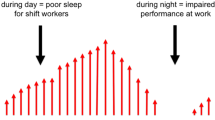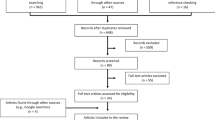Abstract
Background
In times of demographic change, maintaining health and employability of older employees is important. In this context, studies show that stressful working conditions differ by countries. Yet, it is unclear if specific national management practices to deal with these conditions contribute towards explaining country differences.
Methods
This study combines two different data sources. The first one provides detailed information on psychosocial working conditions in 17 European countries, based on 12,284 employees from the Survey of Health, Ageing and Retirement in Europe (SHARE) and the English Longitudinal Study of Ageing (ELSA). We link this information to the second data source that provides information on health and safety management practices in each of the countries under study (collected among 17,477 managers at the level of companies in the Enterprise survey on new and emerging risks (ESENER)). We distinguish six different types of risk management procedures in the analysis.
Results
Results show that levels of psychosocial risks are generally lower in countries with more developed management practices, in particular if national management practices are marked by (1) procedures to deal with work stress, (2) information about whom to address in case of work-related psychosocial problems, and (3) health and safety services provided by psychologists.
Conclusion
The findings underline the importance of a comprehensive psychosocial risk management approach in reducing work-related stress, as lower levels of psychosocial risks are linked to specific psychosocial risk management practices within companies, in particular those pointing to clear responsibilities and coordinated procedures in dealing with psychosocial risks.

Similar content being viewed by others
References
Bonde JPE (2008) Psychosocial factors at work and risk of depression: a systematic review of the epidemiological evidence. Occup Environ Med 65(7):438–445
Börsch-Supan A, Brugiavini A, Jürges H, Mackenbach J, Siegrist J, Weber G (2005) Health, ageing and retirement in Europe: first results from the survey of health, ageing and retirement in Europe. Mannheim Research Institute for the Economics of Aging (MEA), Mannheim
Börsch-Supan A, Brandt M, Hunkler C, Kneip T, Korbmacher J, Malter F, Schaan B, Stuck S, Zuber S (2013a) Data resource profile: the survey of health, ageing and retirement in Europe (SHARE). Int J Epidemiol 42(4):992–1001
Börsch-Supan A, Brandt M, Litwin H, Weber G (eds) (2013b) Active ageing and solidarity between generations in Europe: first results from SHARE after the economic crisis. De Gruyter, Berlin
Bryan ML, Jenkins SP (2016) Multilevel modelling of country effects: a cautionary tale. Eur Sociol Rev 32(1):3–22
Dragano N, Siegrist J, Wahrendorf M (2011) Welfare regimes, labour policies and unhealthy psychosocial working conditions: a comparative study with 9917 older employees from 12 European countries. J Epidemiol Community Health 65(9):793–799
ESENER (2009) European survey on new and emerging risks 2009: sampling report. TNS Infratest Sozialforschung, Munich
European Agency for Safety and Health at Work (2007) Expert forecast on emerging psychosocial risks related to occupational safety and health. European risk observatory report, vol 5. Office for Official Publications of the European Communities, Luxembourg
European Commission (2001) Promoting a European framework for corporate social responsibility, Green Paper. Green paper (European Commission). Office for Official Publications of the European Communities, Luxembourg
European Foundation for the Improvement of Living and Working Conditions (2014) Psychosocial risks in Europe: Prevalence and strategies for prevention. Eurofound/European Agency for Safety and Health at Work, [Dublin]
Jusko KL, Shively WP (2005) Applying a two-step strategy to the analysis of cross-national public opinion data. Polit Anal 13(4):327–344
Karasek R, Theorell T (1990) Healthy work: stress, productivity, and the reconstruction of working life. Basic Books, New York
Karasek R, Brisson C, Kawakami N, Houtman I, Bongers P, Amick B (1998) The Job Content Questionnaire (JCQ): an instrument for internationally comparative assessments of psychosocial job characteristics. J Occup Health Psychol 3(4):322–355
Kivimäki M, Nyberg ST, Batty GD, Fransson EI, Heikkilä K, Alfredsson L, Bjorner JB, Borritz M, Burr H, Casini A, Clays E, de Bacquer D, Dragano N, Ferrie JE, Geuskens GA, Goldberg M, Hamer M, Hooftman WE, Houtman IL, Joensuu M, Jokela M, Kittel F, Knutsson A, Koskenvuo M, Koskinen A, Kouvonen A, Kumari M, Madsen Ida E H, Marmot MG, Nielsen ML, Nordin M, Oksanen T, Pentti J, Rugulies R, Salo P, Siegrist J, Singh-Manoux A, Suominen SB, Väänänen A, Vahtera J, Virtanen M, Westerholm Peter J M, Westerlund H, Zins M, Steptoe A, Theorell T (2012) Job strain as a risk factor for coronary heart disease: a collaborative meta-analysis of individual participant data. Lancet 380(9852):1491–1497
Leka S, Cox T, Zwetsloot G (2008) The European framework for psychosocial risk management. PRIMA-EF. I-WHO, Nottingham
Leka S, Jain A, Iavicoli S, Vartia M, Ertel M (2011a) The role of policy for the management of psychosocial risks at the workplace in the European Union. Safety Sci 49(4):558–564
Leka S, Jain A, Widerszal-Bazyl M, Żołnierczyk-Zreda D, Zwetsloot G (2011b) Developing a standard for psychosocial risk management: PAS 1010. Safety Sci 49(7):1047–1057
Levi L (2000) Guidance on work-related stress: Spice of life or kiss of death? Employment & social affairs. Health and safety at work. Office for Official Publications of the European Communities; Bernan Associates [distributor], Luxembourg, Lanham
Lunau T, Siegrist J, Dragano N, Wahrendorf M (2015) The association between education and work stress: does the policy context matter? PLoS One 10(3):e0121573
Malter F, Börsch-Supan A (eds) (2013) SHARE Wave 4: innovations & methodology. MEA, Max Planck Institute for Social Law and Social Policy, Munich
Marmot M, Siegrist J, Theorell T (2006) Health and the psychosocial environment at work. In: Marmot M, Wilkinson RG (eds) Social determinants of health, 2nd edn. Oxford Univ. Press, Oxford, pp 97–130
Niedhammer I, Sultan-Taïeb H, Chastang J-F, Vermeylen G, Parent-Thirion A (2012) Exposure to psychosocial work factors in 31 European countries. Occup Med (Lond) 62(3):196–202
Nieuwenhuijsen K, Bruinvels D, Frings-Dresen M (2010) Psychosocial work environment and stress-related disorders, a systematic review. Occup Med (Lond) 60(4):277–286
Nyberg ST, Fransson EI, Heikkilä K, Alfredsson L, Casini A, Clays E, De Bacquer D, Dragano N, Erbel R, Ferrie JE, Hamer M, Jöckel K-H, Kittel F, Knutsson A, Ladwig K-H, Lunau T, Marmot MG, Nordin M, Rugulies R, Siegrist J, Steptoe A, Westerholm Peter J M, Westerlund H, Theorell T, Brunner EJ, Singh-Manoux A, Batty GD, Kivimäki M (2013) Job strain and cardiovascular disease risk factors: meta-analysis of individual-participant data from 47,000 men and women. PLoS One 8(6):e67323
Rabe-Hesketh S, Skrondal A (2008) Multilevel and longitudinal modeling using stata, 2nd edn. Stata, College Station
Rial González E, Cockburn W, Irastorza X (2009) ESENER-European survey of enterprises on new and emerging risks. European Agency for Safety and Health at Work, Luxembourg
Rugulies R, Krause N (2008) Effort-reward imbalance and incidence of low back and neck injuries in San Francisco transit operators. Occup Environ Med 65(8):525–533. doi:10.1136/oem.2007.035188
Siegrist J (1996) Adverse health effects of high-effort/low-reward conditions. J Occup Health Psychol 1(1):27–41
Siegrist J, Starke D, Chandola T, Godin I, Marmot M, Niedhammer I, Peter R (2004) The measurement of effort-reward imbalance at work: European comparisons. Soc Sci Med 58(8):1483–1499
Steptoe A, Breeze E, Banks J, Nazroo J (2013) Cohort profile: the English longitudinal study of ageing. Int J Epidemiol 42(6):1640–1648
Theorell T, Hammarström A, Aronsson G, Träskman Bendz L, Grape T, Hogstedt C, Marteinsdottir I, Skoog I, Hall C (2015) A systematic review including meta-analysis of work environment and depressive symptoms. BMC Public Health 15:738
van Stolk C, Staetsky L, Hassan E, Woo C (2012) Management of psychosocial risks at work: An analysis of the findings of the European Survey of Enterprises on New and Emerging Risks. Publications Office of the European Union, Luxembourg
Wahrendorf M, Siegrist J (2014) Proximal and distal determinants of stressful work: framework and analysis of retrospective European data. BMC Public Health 14:849
Acknowledgements
This paper uses data from SHARE wave 4 release 1.1.1, as of March 28th 2013 (doi:10.6103/SHARE.w4.111). The SHARE data collection has been primarily funded by the European Commission through the 5th Framework Programme (Project QLK6-CT-2001-00360 in the thematic programme Quality of Life), through the 6th Framework Programme (Projects SHAREI3, RII-CT-2006-062193, COMPARE, CIT5- CT-2005-028857, and SHARELIFE, CIT4-CT-2006-028812) and through the 7th Framework Programme (SHARE-PREP, N° 211909, SHARE-LEAP, N° 227822 and SHARE M4, N° 261982). Additional funding from the U.S. National Institute on Aging (U01 AG09740-13S2, P01 AG005842, P01 AG08291, P30 AG12815, R21 AG025169, Y1-AG-4553-01, IAG BSR06-11 and OGHA 04–064) and the German Ministry of Education and Research as well as from various national sources is gratefully acknowledged (see http://www.share-project.org for a full list of funding institutions). Data from ELSA were made available through the UK Data Archive (UKDA). ELSA was developed by a team of researchers based at the National Centre for Social Research, University College London and the Institute for Fiscal Studies. The data were collected by the National Centre for Social Research. The funding is provided by the National Institute of Aging in the United States, and a consortium of UK government departments coordinated by the Office for National Statistics. The developers and funders of ELSA and the Archive do not bear any responsibility for the analyses or interpretations presented here.
Author information
Authors and Affiliations
Corresponding author
Ethics declarations
Conflict of interest
The authors declare that they have no competing interests.
Rights and permissions
About this article
Cite this article
Lunau, T., Dragano, N., Siegrist, J. et al. Country differences of psychosocial working conditions in Europe: the role of health and safety management practices. Int Arch Occup Environ Health 90, 629–638 (2017). https://doi.org/10.1007/s00420-017-1225-z
Received:
Accepted:
Published:
Issue Date:
DOI: https://doi.org/10.1007/s00420-017-1225-z




